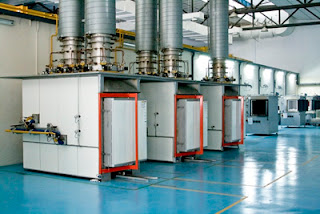Are we really moving forward?
I got a note from Bobby Free yesterday about kilns. He is dismantling some old kilns and building his own.
Many of the Art schools today are ordering their kilns from Europe and they are computer assisted. These computer systems allow remote control of the operation and even identification and problem solving by means of remote sensing. In this way the kiln manufacturer can provide fast and efficient service worldwide by means of an external monitor. In other words you're up shit creek without a paddle if something goes wrong. Not to worry an engineer in a white lab coat will be on the next flight from Europe to help you get on track again. Is ceramics really moving forward? Are students going to graduate from college with a tool box full of skills to make a living as studio potters? Who could afford these kilns much less the price of an airfare from the Netherlands to fix your kiln not working in Helena, Montana two weeks before your annual holiday sale?
Bobby you're doing the right thing. The kiln may or may not be pretty but the pots will be. My theory is some of the ugliest pots I've seen in my life come from the most beautiful kilns and some of the potters I know that make wonderful work have kilns that look like a pile of bricks with a chimney. Go figure!
Many of the Art schools today are ordering their kilns from Europe and they are computer assisted. These computer systems allow remote control of the operation and even identification and problem solving by means of remote sensing. In this way the kiln manufacturer can provide fast and efficient service worldwide by means of an external monitor. In other words you're up shit creek without a paddle if something goes wrong. Not to worry an engineer in a white lab coat will be on the next flight from Europe to help you get on track again. Is ceramics really moving forward? Are students going to graduate from college with a tool box full of skills to make a living as studio potters? Who could afford these kilns much less the price of an airfare from the Netherlands to fix your kiln not working in Helena, Montana two weeks before your annual holiday sale?
Bobby you're doing the right thing. The kiln may or may not be pretty but the pots will be. My theory is some of the ugliest pots I've seen in my life come from the most beautiful kilns and some of the potters I know that make wonderful work have kilns that look like a pile of bricks with a chimney. Go figure!



Comments
So is this really doing the students a favour?
I love the old school method, learn your craft,glazes, your clays, and go from there. I learned well Tony, your message about glaze sharing...why not...you will fire it to your own way anyway....so unless you are doing a bazillion dishes, I see no need to run out and buy one of those NEW kilns unless you are a Gazillionaire! A pile of brick, some seement, and a good eye will serve you well!! Wood, coal, oil, gas, will always serve you right when the power fails!
Fransy!
Currently my choice is to let the magic happen without the use of computers. I find myself overriding my computer more times than not as I watch cone packs...... and I fire oxidation.
Seems those who flip switches and walk away are missing the magic.
With or without the controls, this is still an alchemists art form.
It would be fine if they were just an addition then they would add to the students' experience.
The technology was developed for industry, as I recall - and as with any 'new technology' there will be a trickle-down effect where the price is within reach of the studio artist/potter.
There is always the issue of high-touch v.s. high-tech -- where you sit is your opinion -but to say that one is wrong or better is --- well wrong.
It's something to consider for the future - if one were to fire earthenware in oxidation, then maybe this is type of kiln is a long-term cost savings over a Bartlett controlled Oval.
Maintenance is an issue - For your information Blaauw has a North American repair/service guy. But if you're a studio potter, you take care of your equipment -- institutions have to deal with sloppy loading/chipping/banging oxyprobes and thermocouples --- in other words $$$
Its here - lets play with it like any other technology or tool
I'm a new poster. Looking forward to following your blog.